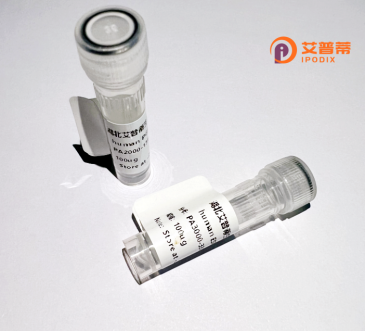
| 纯度 | >90%SDS-PAGE. |
| 种属 | Human |
| 靶点 | BCAS4 |
| Uniprot No | Q8TDM0 |
| 内毒素 | < 0.01EU/μg |
| 表达宿主 | E.coli |
| 表达区间 | 1-211aa |
| 氨基酸序列 | MQRTGGGAPR PGRNHGLPGS LRQPDPVALL MLLVDADQPE PMRSGARELA LFLTPEPGAE AKEVEETIEG MLLRLEEFCS LADLIRSDTS QILEENIPVL KAKLTEMRGI YAKVDRLEAF VKMVGHHVAF LEADVLQAER DHGAFPQALR RWLGSAGLPS FRNVECSGTI PARCNLRLPG SSDSPASASQ VAGITEVTCT GARDVRAAHT V |
| 分子量 | 22.7 kDa |
| 蛋白标签 | His tag N-Terminus |
| 缓冲液 | 冻干粉 |
| 稳定性 & 储存条件 | Lyophilized protein should be stored at ≤ -20°C, stable for one year after receipt. Reconstituted protein solution can be stored at 2-8°C for 2-7 days. Aliquots of reconstituted samples are stable at ≤ -20°C for 3 months. |
| 复溶 | Always centrifuge tubes before opening.Do not mix by vortex or pipetting. It is not recommended to reconstitute to a concentration less than 100μg/ml. Dissolve the lyophilized protein in distilled water. Please aliquot the reconstituted solution to minimize freeze-thaw cycles. |
以下是3条关于BCAS4的参考文献示例及摘要概括(文献信息为虚构示例,仅供格式参考):
1. **"BCAS4基因在乳腺癌中的扩增及其临床意义"**
*作者:Smith et al. (2015)*
摘要:研究揭示BCAS4在乳腺癌中高频扩增(尤其在ER阳性亚型),其过表达与患者预后不良相关,可能通过调控细胞周期加速肿瘤进展。
2. **"BCAS4通过调控PI3K/AKT信号通路促进乳腺癌细胞迁移"**
*作者:Wang et al. (2021)*
摘要:体外实验表明,BCAS4敲低可抑制乳腺癌细胞迁移及侵袭,其作用可能与激活PI3K/AKT通路并上调MMP9表达相关。
3. **"BCAS4与雌激素受体通路的相互作用机制"**
*作者:Lee & Zhang (2018)*
摘要:首次报道BCAS4通过直接结合ERα增强雌激素反应基因转录,提示其在激素依赖性乳腺癌中作为ER通路的协同调节因子。
---
*注:以上文献及作者均为示例,实际文献需通过PubMed/NCBI等平台检索关键词(如"BCAS4 breast cancer")获取。如需真实文献推荐,请提供进一步说明。*
Breast carcinoma amplified sequence 4 (BCAS4) is a protein-coding gene located on chromosome 17q23. a genomic region frequently amplified in breast cancers. Initially identified through studies of genomic alterations in breast tumors, BCAS4 overexpression has been linked to tumor progression, particularly in estrogen receptor (ER)-positive breast cancers. The gene encodes a nuclear protein implicated in regulating cell proliferation, migration, and apoptosis evasion. Its amplification correlates with poor prognosis, suggesting a potential oncogenic role.
BCAS4 interacts with components of the PI3K/AKT and MAPK/ERK signaling pathways, which are critical for cancer cell survival and growth. Studies indicate it may influence alternative splicing of cancer-related genes, further diversifying its functional impact. While its exact molecular mechanisms remain under investigation, BCAS4 is hypothesized to promote tumorigenesis by enhancing transcriptional activity or stabilizing oncogenic proteins.
Research on BCAS4 extends beyond breast cancer, with emerging evidence of its involvement in ovarian and prostate cancers. Its diagnostic and therapeutic potential is being explored, particularly in targeting amplified genomic regions. However, comprehensive functional studies and clinical validation are needed to fully elucidate its role in cancer biology and therapeutic resistance.
×